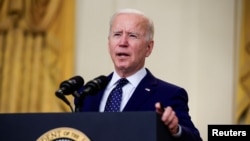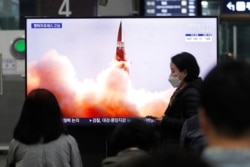President Joe Biden’s efforts to rescue and ultimately reshape the U.S. economy may be getting most of the attention, but his administration has also been busy on the international front, in large part by expanding and adjusting the vast net of sanctions that the U.S. imposes on countries and individuals around the world.
In his first weeks in office, Biden imposed new sanctions on individuals in Russia over interference in U.S. elections; on generals in Myanmar for their overthrowing a democratically elected government; on Saudi Arabian nationals involved in the killing of Washington Post journalist Jamal Khashoggi; on Chinese officials for undermining Hong Kong’s democracy movement and human rights abuses against the country’s Uyghur minority; and against an Israeli businessman accused of corruption.
The new administration has also begun adjusting existing sanctions regimes, lifting those leveled at officials affiliated with the International Criminal Court, and considering a rollback of additional sanctions imposed on Iran after then-President Donald Trump withdrew the U.S. from the Joint Comprehensive Plan of Action nuclear deal.
True to form
For all of Biden’s repeating that America is “back” on the international stage, when it comes to trying to influence other countries via sanctions, the U.S. never actually left.
For decades, and increasingly since the attacks of September 11, 2001, the U.S. has employed sanctions as a means of coercing other countries into policy changes or, at very least, expressing its distaste for actions the government views as unacceptable.
“Sanctions have become, to a large extent, the default tool for addressing concerns about the behavior of foreign governments,” said Jordan Tama, a professor in the School of International Service at American University in Washington who studies sanctions policy.
“In most situations where the United States has a concern about the behavior of foreign governments, sanctions are going to be part of the policy conversation about what the United States should do,” Tama said. “And often sanctions appear more attractive to policymakers than some of the other alternatives, such as military action, which has obvious costs, or, as it's often framed, ‘doing nothing’ by engaging in diplomacy. That's kind of what gives sanctions their appeal.”
Comprehensive sanctions
The Treasury Department’s Office of Foreign Assets Control (OFAC) manages three dozen different sanctions programs, some of which target specific countries while others go after criminals, terrorist networks or human rights abusers.
So-called “comprehensive” sanctions, such as the U.S. travel and trade embargoes on Cuba, North Korea, Iran, Syria and the Crimean region of Ukraine annexed by Russia in 2014, are the most severe, with the ability to do great damage to a nation’s economy, often at the expense of the citizens the policy is nominally intended to help.
Other countries, including Russia, China and Venezuela, are also subject to significant sanctions that fall short of an outright trade embargo.
Targeted sanctions
The U.S. also imposes “targeted” sanctions, typically aimed at individuals and business entities engaged in certain activities, such as Chinese government officials involved in the internment of Muslim Uyghurs, or Russian banks accused of laundering money for corrupt oligarchs.
OFAC’s list of subjects of targeted sanctions, who are known as “Specially Designated Nationals,” runs to 1,500 pages and contains the names (and countless aliases) of thousands of individuals and companies with which U.S citizens are barred from doing business.
Being placed on that list can be financially devastating for those who do not have the support of a sovereign government, because it freezes all assets held in U.S. jurisdictions and bars financial institutions that operate in U.S. jurisdictions from conducting dollar-based transactions with them. Because of the importance of the U.S. market to the global financial services business, the dollar transaction ban can effectively shut a person or company off from the global economy.
But do they work?
For a tool that has been used for as long and as widely as U.S. sanctions, there is still considerable debate about how effective they are. Proponents can point to a few big wins, such as the fall of the apartheid government in South Africa and Iran’s accession to nuclear talks during the Obama administration, both of which followed years of punishing economic sanctions.
But opponents can point to a far larger number of cases in which sanctions failed to achieve their ends. Cuba, for instance, remains a communist thorn in the side of U.S. presidents despite 60 years of economic deprivation associated with the embargo. North Korea’s nuclear weapons program has grown, not disappeared, in the face of a comprehensive sanctions regime.
On balance, according to an analysis by Jeffrey J. Schott, a senior fellow at the Peterson Institute for International Economics, a Washington research group, and a member of the State Department’s Advisory Committee on International Economic Policy, sanctions have achieved their desired outcome about one-third of the time, and usually when their aims have been modest.
Return to multilateralism
Under the Trump administration, sanctions were used frequently, but often on an ad hoc basis, with little coordination with other countries. That, said American University’s Tama, is typically the least effective method of changing a country’s behavior.
“Sanctions are more effective when they're coordinated with allies and partners,” he said, and Biden’s predilection toward multilateralism may make his imposition of sanctions more effective than those of his predecessors.
Additionally, Tama said he expected to see the Biden administration take more care to pair U.S. sanctions with other aspects of U.S. foreign policy, including active diplomatic engagement, foreign aid and military deterrence.
A major challenge
Over the years, there has been a growing recognition that some U.S. sanctions programs have taken a high economic toll on the innocent civilian populations in targeted countries, often without producing the desired outcome. In addition, they may have the effect of pushing countries away from using the dollar and doing business through U.S. institutions.
“One of the challenges for the use of sanctions is how can we preserve the effectiveness of this tool and still use sanctions when needed, while recognizing that sometimes sanctions can have some effects that we really don't want,” said Tama.
It’s far from clear how the Biden administration will address this problem, but one step toward doing so appears to have been taken. The administration will be relaunching the State Department’s Office of Sanctions Coordination, an operation closed by the Trump administration in 2017, to better align sanctions policies and implementation across various federal agencies.







